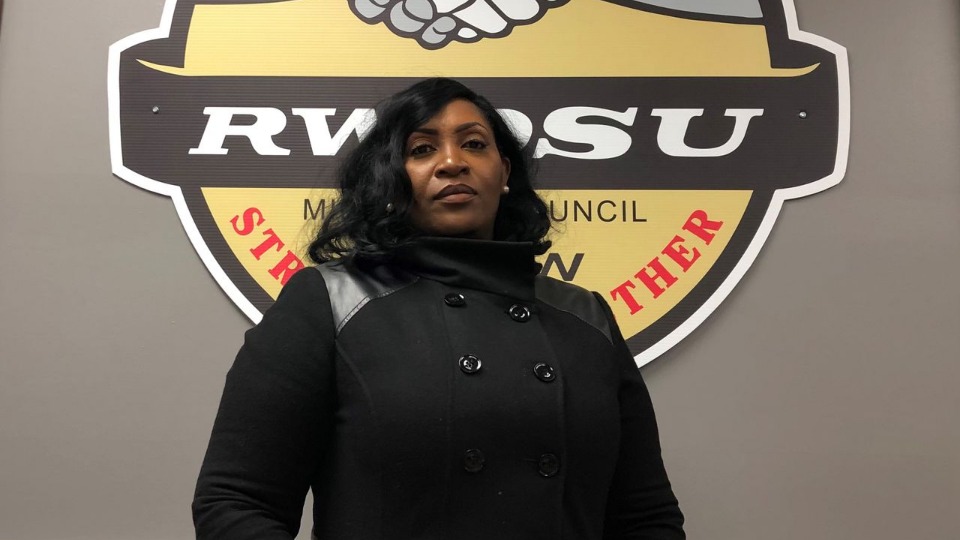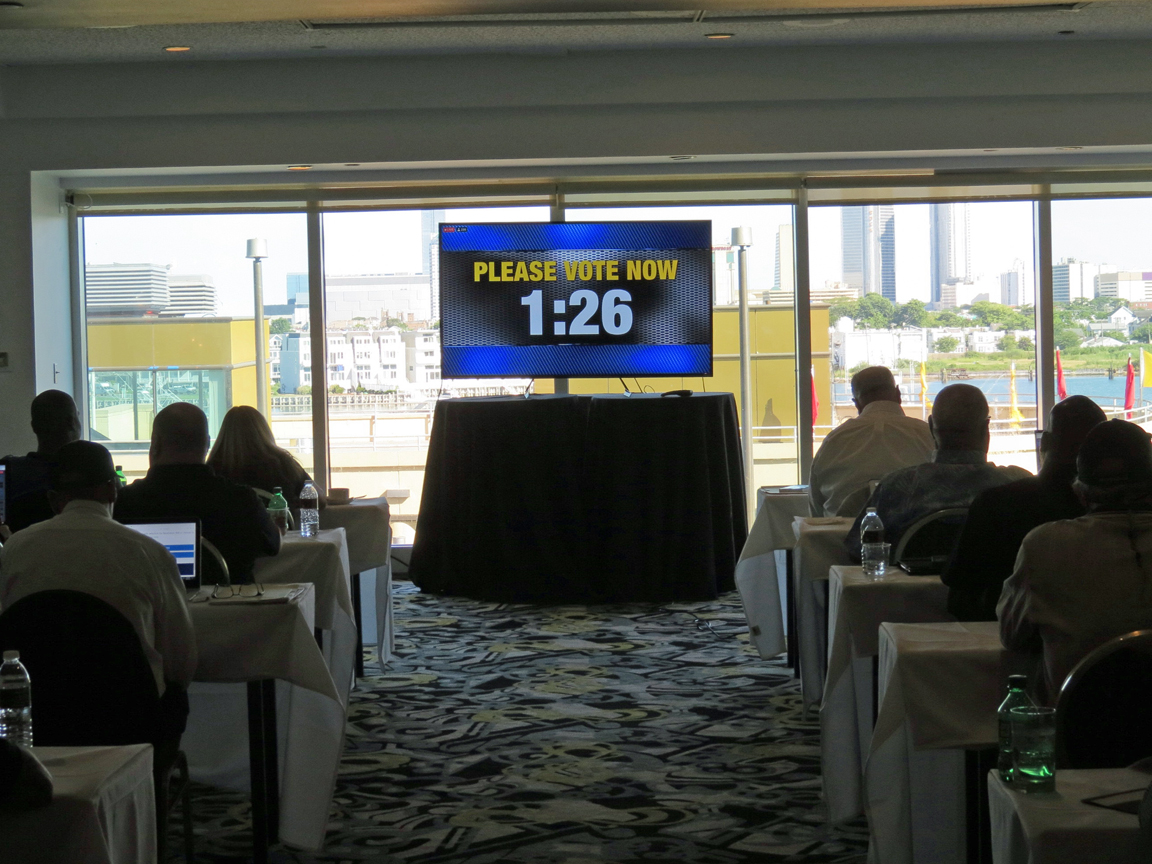|

Jennifer Bates PHOTO/RWDSU
March 19, 2021
Via Press Associates, Inc.
What is it really like to work at Amazon, owned by the world’s richest person, Jeff Bezos, which is also fighting unionization by the 5,805 low-paid oppressed and exploited workers, many if not most workers of color, at its Bessemer, Ala., warehouse? Jennifer Bates, a “learning ambassador” there and a leader in the workers’ fight to unionize with the Retail, Wholesale and Department Store Union/UFCW, brought the inside story to the Senate Budget Committee on March 17. We reprint her testimony below. The workers are voting by mail now. Results will be announced on March 29:
“Good morning, Chairman Sanders, Ranking Member Graham, and members of the committee. Thank you for the opportunity to testify today.
“My name is Jennifer Bates and I work in Bessemer, Ala., where my coworkers and I are trying to form a union at Amazon with the Retail, Wholesale and Department Store Union.
“Amazon brags it pays workers above the minimum wage. What they don’t tell you is what those jobs are really like. And they certainly don’t tell you that they can afford to do much better for their workers.
“Working at an Amazon warehouse is no easy thing. The shifts are long. The pace is super-fast. You are constantly being watched and monitored. They seem to think you are just another machine.
“I started working at Amazon in May of 2020, not too long after they opened. By my third day, I was hurting. I looked around and saw it wasn’t just me. I mentioned it to my sister who also worked there at the time, and she just told me it only gets worse.
“At Amazon, you are on your feet walking all the time and climbing stairs to get to your station and move products. We have two 30-minute breaks during a 10-hour shift which is not long enough to give you time to rest. The place is huge--the size of 16 football fields. Just walking the long way to the bathroom and back eats up precious break time.
“My co-workers and I—older, younger, middle-aged people—limp from climbing up and down the stairs in the four-floor building. When I first came in to work, I noticed there was one elevator for human use. When I tried to use it, a co-worker stopped me and told me we weren’t allowed to use it.
“Then I noticed that around the facility there were plenty of elevators, but the signs say, ‘material only, no riders.’ I couldn’t believe they built a facility with so many elevators for materials and make employees take the stairs on a four-flight facility.
“The work itself is also grueling. We have to keep up with the pace. My workday feels like a 9-hour intense workout every day. And they track our every move. If your computer isn’t scanning, you get charged with being time-off-task. From the onset, I learned that if I worked too slow or had too much time off task I could be disciplined or even fired. Like a lot of workers, it was too much for my sister. She ended up quitting.
“I thought there should be another way. I mean why can’t such a large and wealthy company do better for their workers? Amazon even took away our essential worker pay in the middle of the pandemic. Meanwhile, Amazon has made tons of money during this crisis. Jeff Bezos is the richest man in the world. And now he’s even richer thanks to us workers.
“They expect us not to expect anything we didn’t already have. Like we do not deserve better. Amazon goes into poor communities claiming they want to help with economic growth.
“That should mean paying its employees a living wage and benefits that truly match the cost of living, and ensure workers work in safe and healthy conditions. Because we are not robots designed to only live to work. We work to live. We deserve to live, laugh and love, and have full self-fulfilling lives.
“We the workers deserve to be treated with dignity and respect and deserve to be given the same commitment that we give to the job every day we go in. We give 100% at work, but it feels like we’re being given back 30%. We’re committed to making sure the customers get a nice package, the whole product in a couple of days. But who is looking out for us?
“We, the workers, made the billions for Amazon. I often say we are the billionaires--we just don’t get to spend it. “We first started to talk about unionizing one day during a break. One guy said, ‘They wouldn’t be doing this to us if we had a union.’ People were upset about the breaks being too short and not having enough time to rest. About being humiliated by having to go through random security checks to make sure we’re not stealing merchandise and then not even being given that time back from our break time.
“Others didn’t like that they never actually spoke to a manager--they just got messages on the app or by text. It’s all so impersonal and at times just plain weird. And then there’s job security. People are concerned about people getting fired for no real reason and not being given the opportunity to speak to anybody at Amazon about it.
“They deny us good working conditions and claim we should be happy with what we have, and then go around spending millions to tell us we don’t need a union. “As soon as Amazon found out about us working with RWDSU, they started going hard trying to stop the union drive. We were forced into what they called ‘union education’ meetings. We had no choice but to attend them. They would last for as much as an hour and we’d have to go sometimes several times a week.
“The company would just hammer on different reasons why the union was bad. And we had to listen. If someone spoke up and disagreed with what the company was saying they would shut the meeting down and told people to go back to work. Then follow up with one-on-one meetings on the floor.
“A lot of what was said in those meetings was untrue, like telling people they'd lose their benefits if they joined the union. It was upsetting to see some younger people who were on board with the union get confused by what was being said in the meetings. “All around the plant, Amazon put up anti-union signs and messages. They sent messages to workers' phones. They even had signs posted in the bathroom stall. No place was off-limits. No place seemed safe.
“Despite all that, or maybe because of it, we continue to organize and build support for the union. We do it because we hope that with a union we will finally have a level playing field. We hope we will be able to talk to someone at HR without being dismissed. We hope that we will be able to rest more, that there will be changes in the facility to take some of the stress off our bodies.
“We’re hoping we get a living wage—not just [Amazon's] minimum wage, and be able to provide better for our families. We hope they will start to hear us and see us and treat us like human beings. “It’s frustrating that all we want is to make Amazon a better place to work. Yet Amazon is acting like they are under attack. Maybe if they spent less time--and money--trying to stop the union they would hear what we are saying. And maybe they would create a company that’s as good for workers and our community as it is for shareholders and executives.
“Thank you for giving me this time to share my story.”
|




